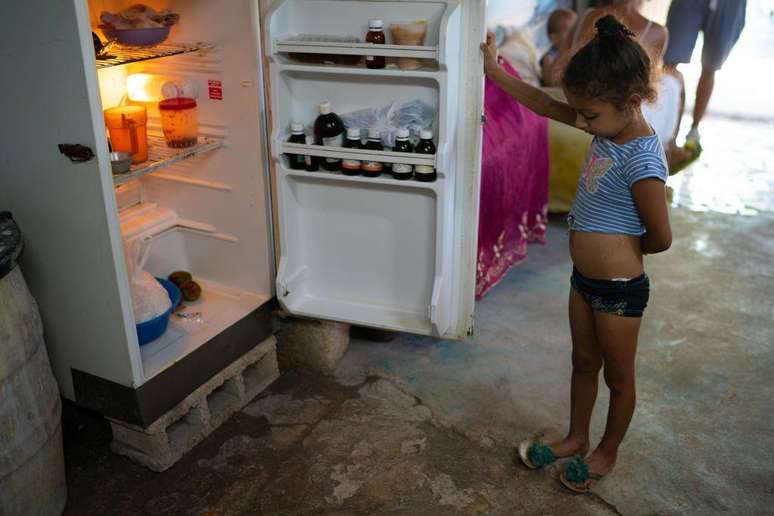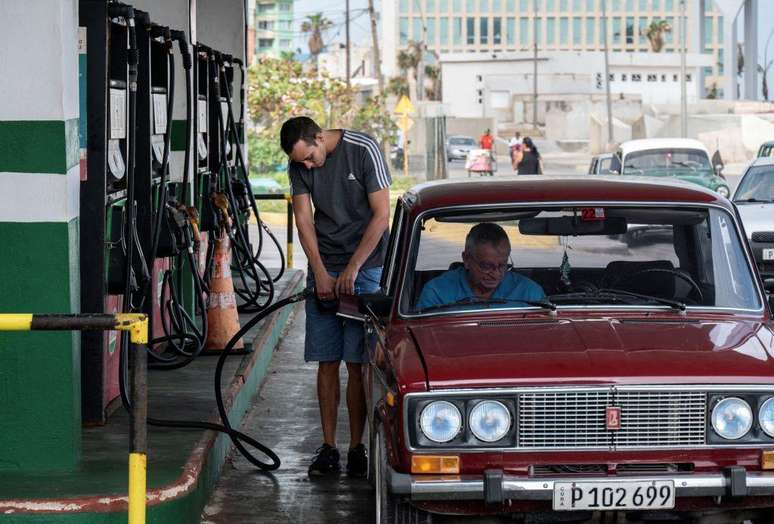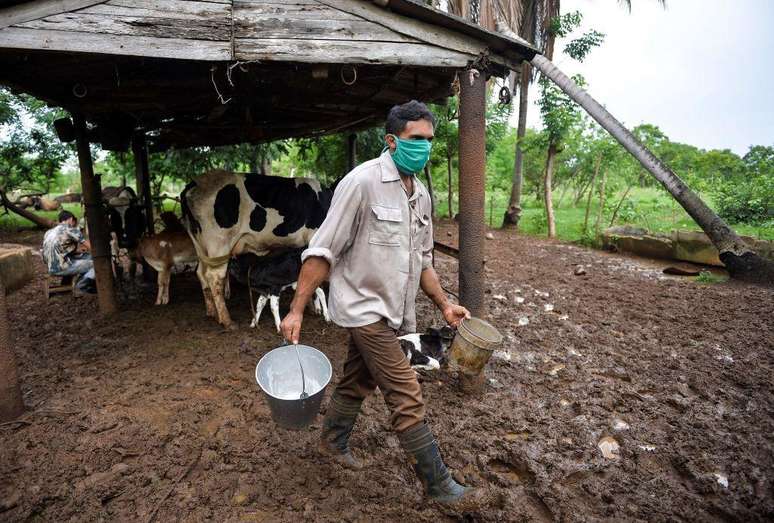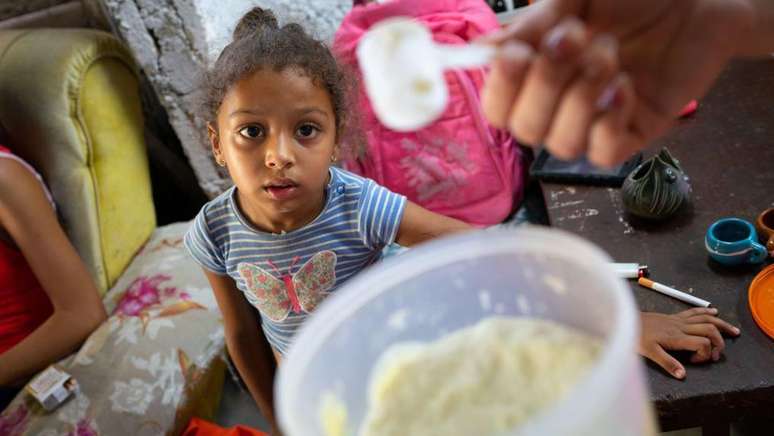Amid food shortages on the island, the government wants to maintain the distribution of subsidized milk for children under seven.
The economic situation in Cuba is so difficult that for the first time the government has officially asked the United Nations World Food Program (WFP) for help to maintain the distribution of subsidized milk to children under seven.
A spokesperson for the international organization confirmed to BBC News Mundo, the BBC’s Spanish-language service, that the WAP had formally received the request from Miguel Díaz-Canel’s government and added that it is already providing assistance to the country.
With the support of the humanitarian organization, the government will try to maintain a monthly supply of one kilogram of milk powder to children on the island.
The United Nations program underlined the importance of the request, through a statement released by the EFE news agency, in the context of the “deep economic crisis” which “is having a significant impact on the food and nutritional security of the population”.
“This is the first time that Cuba has asked for support by issuing an official communication at the highest level of the WAP hierarchy,” the statement read.
Children up to seven years old and people on a special diet receive milk through booklet (ration cards) with a price subsidized by the government, but in recent months the product has become increasingly scarce.
The situation was recently recognized by the Minister of Internal Trade, Betsy Díaz Velázquez, who said that measures are being taken to ensure that the most vulnerable population receives subsidized milk.
“The amount of milk powder available today means that priorities need to be prioritized,” he said, according to local press.
BBC News Mundo attempted to contact the Cuban government about this situation, but has so far received no response.

As an emergency measure, some provinces have had to limit distribution of the product to fewer people or reduce the quantities distributed. Local information also suggests that vitamin products are delivered in some areas to replace milk consumption.
Although it is possible to find liquid and powdered milk in the markets, the prices are inaccessible to the vast majority of the Cuban population.
Since the 1960s, the Cuban government has implemented a food assistance program through the delivery of some basic basket products, but due to the continuous crises that the country has suffered in recent years, many families say they do not even have food to eat. cover the minimum requirement.

Strategic secrets
Pascal Fletcher, BBC Monitoring analyst
Although Cuban ministers often appear on state television to explain food and energy shortages to the population and to announce proposed solutions, specific details about the island’s supply situation are generally considered sensitive and a strategic secret.
The same would apply to requests for help from Cuban leaders to other countries and institutions.
While acknowledging the shortages and difficulties in supplying fuel, medicines and basic foods such as bread and milk, Cuban authorities insist on pointing to the long-standing economic embargo imposed by the United States on the island as the main source of Cuba’s daily problems.
They also accuse “enemies,” namely the U.S. government and radical Cuban exiles, of using sanctions and shortages to try to foment anti-government unrest in Cuba, as well as exaggerating problems to undermine morale and loyalty to the single communist party. system.
Therefore, it is not surprising that the news that Cuba had asked the United Nations World Food Program for help in providing milk to children was not highlighted by state media.
They were rather interested in underlining, as a “strategic priority”, the intensification of the fight against “crime, corruption, illegalities and social indiscipline” by the authorities, promising a “heavy hand” against such practices.
They also announced plans to raise gasoline and electricity prices starting March 1, something Cubans have been waiting for, wondering how they will deal with this severe squeeze on their already strained family budgets.
However, on February 16, the Minister of Internal Trade, Betsy Díaz Velázquez, announced problems with “the distribution of milk”, citing “difficulties in purchasing milk powder abroad” and problems with domestic supply and processing in the national dairy industry.
It also specifically acknowledged “the valuable contribution of the World Food Program through donations” among efforts to address the issue.
The UN agency has been in Cuba since 1963 and provides food assistance to the island especially after major natural disasters, such as hurricanes.
It also participated in school feeding programs and provided formula milk for children aged six to 23 months.
In recent years, WFP has stepped up this support as Cuba, like many other developing economies, has been hit hard by the Covid-19 pandemic and rising food and energy prices caused by Russia’s war in Ukraine.
Food donations to Cuba, such as vegetable oil from Havana’s ally Russia, are also usually sent through WFP.
The news that the Cuban government has turned directly to WFP leaders for help simply confirms what most Cubans recognize in everyday life: that the economic situation on the island is dire and that the government faces challenges complex to deal with. insisting on “not giving in” to requests for political change.

Additional restrictions
In the context of the pressing food situation, this Friday (01/03), one month after the initially planned date, a petrol price adjustment of more than 400% will come into force.
Vladimir Regueiro, Minister of Finance and Prices, also informed that there will be a 25% increase in the price of electricity tariffs for the sectors with the highest consumption, as part of a series of measures announced in December with the aim of reducing the fiscal deficit. in the country.

The increase in gasoline prices has caused great concern among Cubans, who fear an increase in prices in the country.
Long queues and crowds were reported at petrol stations in January, before the government postponed the measures coming into force, citing “a cyber security incident in the IT systems”.
In the same week, the Minister of Economy, Alejandro Gil, was fired from his position. He was one of the island’s most prominent politicians at the time and had admitted that the government could not continue to subsidize fuel.
An increase in the price of liquefied gas is also expected this year.
These measures represent one of the largest macroeconomic adjustments made by the government in recent decades in response to a crisis often compared to that of the so-called Special Period, when the Soviet Union collapsed in the 1990s and Cuba was left without its main economic and financial resources . political support abroad.
President Díaz-Canel attributed the fuel problem to the violation of commitments by countries supplying oil to the island, due to “a complex energy situation”.
Venezuela is Cuba’s main oil supplier, while Mexico and Russia have contributed since last year to alleviating the island’s serious deficit.
According to official estimates, the Cuban economy contracted by around 2% in 2023, while inflation closed at 30%.

Source: Terra
Rose James is a Gossipify movie and series reviewer known for her in-depth analysis and unique perspective on the latest releases. With a background in film studies, she provides engaging and informative reviews, and keeps readers up to date with industry trends and emerging talents.







